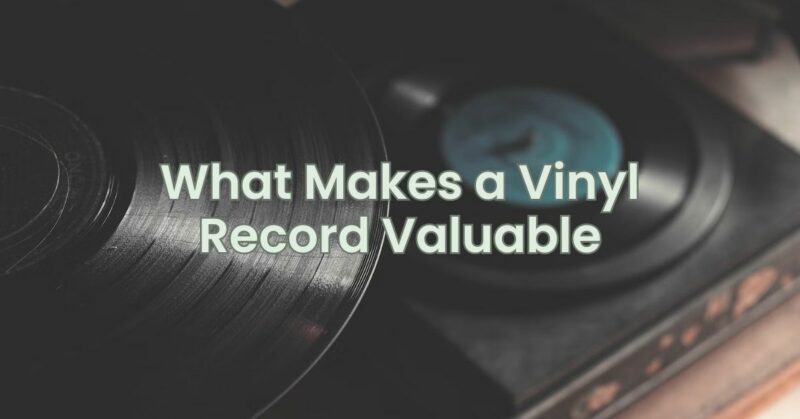Vinyl records have captivated music enthusiasts for decades, not only for their rich sound but also for their potential value as collectibles. However, determining the value of a vinyl record can be a complex process influenced by various factors. In this article, we will delve into the elements that contribute to the value of a vinyl record, helping you understand what makes certain records highly sought after by collectors.
- Rarity and Scarcity: One of the primary factors that can elevate the value of a vinyl record is its rarity and scarcity:
a. Limited Editions: Records released in limited quantities, such as special editions, promotional copies, or exclusive pressings, are often highly valued by collectors due to their limited availability.
b. First Pressings: The first pressing of a record, particularly if it features unique characteristics or includes additional content, can hold greater value compared to subsequent reissues or repressings.
c. Obscure or Forgotten Releases: Records from lesser-known or obscure artists, especially those with limited distribution or short-lived careers, can gain value over time due to their scarcity and the interest they generate among collectors.
- Condition: The condition of a vinyl record significantly impacts its value, as collectors seek records in the best possible state:
a. Mint or Near-Mint Condition: Records in pristine condition, with no visible marks or damage, are highly sought after and typically command higher prices in the collector’s market.
b. Sleeve and Packaging: The condition of the record sleeve and any accompanying inserts, posters, or additional materials also affects the overall value. Well-preserved original sleeves with minimal wear can significantly enhance a record’s value.
- Historical Significance and Cultural Impact: The historical and cultural significance of a record can greatly influence its value:
a. Iconic Albums and Artists: Records from influential artists or groundbreaking albums that have left an indelible mark on music history often hold higher value due to their cultural impact and enduring popularity.
b. Limited or Controversial Releases: Records that were subject to censorship, banned, or had limited release due to controversial content or legal issues can become highly sought after by collectors interested in music history and cultural artifacts.
- Collectability and Demand: The level of collectability and demand among vinyl enthusiasts significantly affects a record’s value:
a. Genre and Fan Base: Certain music genres and specific fan bases have dedicated collectors who actively seek records within their niche. This high demand for specific genres or artists can drive up the value of records associated with them.
b. Regional and Independent Releases: Records from independent labels or regional scenes that gained cult followings or significant recognition can hold increased value among collectors interested in discovering rare and unique musical gems.
Conclusion: The value of a vinyl record is influenced by a combination of factors, including rarity, condition, historical significance, and demand. Records that possess a combination of these elements often command higher prices in the collector’s market. However, it is important to remember that the value of a record is subjective and can vary among collectors based on personal preferences and interests.
While some records may hold significant monetary value, the true worth of vinyl lies in the joy, nostalgia, and appreciation they bring to the listener. Whether you’re a passionate collector or an avid music lover, the value of a vinyl record ultimately resides in the pleasure derived from spinning it on a turntable and immersing yourself in the timeless beauty of analog sound.


